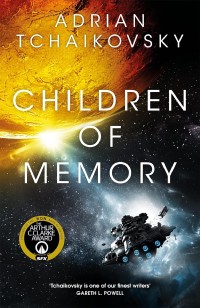
“They think.”
“Not thinking like us, though.”
“Well that’s to be expected.”
Book 1: Children Of Time ⭐⭐⭐⭐⭐ Book 2: Children Of Ruin ⭐⭐⭐⭐▫️ Book 3: Children Of Memory ⭐⭐⭐⭐⭐
Minor spoilers below about the basic premise of the series/novel ¶
Children of Memory is the third novel in the Children of Time series by Adrian Tchaikovsky. It follows in the footsteps of the first two books by giving us another story about characters (various uplifted species, human/AI constructs and one fungi species) being thrust together onto another planet.
As per usual, hijinks ensue.
Spoilers how the story is told ¶
I think that the two previous books had better pacing and were more interesting rollercoaster rides. This one isn’t bad per say but I didn’t like it as much. The story is told out of order and that’s usually a hard sell for me (although I did appreciate being told when/where the chapters were taking place in the timeline).
Children of Memory fell a little flat for me because I prefer novels that don’t withhold information from the reader to inject mystery and intrigue into a story instead of just telling an interesting story in the first place. Children of Memory feels more like an M. Night. Shyamalan movie this time around.
More spoilers ahead ¶
Withholding a bit of information is fine as long as the story being told holds up on its own without the reader knowing about the “twist”. There’s a few chapters that feel pretty miserable to read because they’re sort of remixes of previous chapters (the child POV also didn’t really help with this). At times it felt like Adrian was padding out the page count instead of trying to tell an interesting story.
Overall, I enjoyed reading through Children of Memory. I applaud it for being a little avant garde in terms of how the story is told but I’m not sure that it completely sticks the landing.
If you’re a fan of the series or you’re interested in unpacking some of the philosophical questions raised by the book, I can recommend it.
“You don’t think what they have here, their culture, their traditions, is worth preserving?” Miranda asks, because to her it absolutely is. It’s different, and difference is the only resource the universe is short of. So much of it is just empty sameness. Life is rare, and needs to be studied and admired and encouraged to be itself."